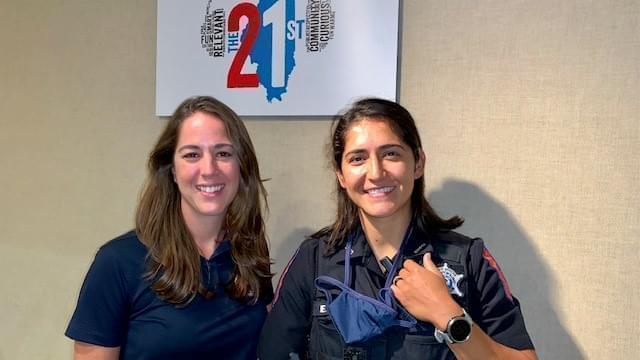How can mental health responders change policing?

Members of UIUC Response, Evaluation and Crisis Help (REACH) - left: Megan Cambron, Crisis Outreach Coordinator, University of Illinois Police Department and Elma Halpin, Behavioral Health Detective, University of Illinois Police Department. Reginald Hardwick/Illinois Newsroom
Stephon Edwards Watts was just 15-years-old when he was shot and killed by Calumet City Police in the basement of his own home in 2012. He was diagnosed with Asperger's Syndrome. His parents made a 911 call because he was in mental distress. During the response to that call, Watts was killed by police. New legislation in Illinois, known as the Stephon Edwards Watts Act, aims to prevent such tragedies by providing trained mental health workers to respond instead of, or alongside, police. To talk about that new legislation and different responses to mental health emergencies, we were joined by two representatives from the University of Illinois Urbana-Champaign Police Department, a registered nurse who leads a program in which clinicians partner with the Springfield police and the leader of a program offering alternatives to calling the police during mental health crises.
GUESTS:
Megan Cambron, LCSW
Crisis Outreach Coordinator, University of Illinois Police Department
Elma Halpin
Behavioral Health Detective, University of Illinois Police Department
Sara Anderson, LCSW
Memorial Behavioral Health, Springfield
Loren Phillips
Renaissance Living Room Team Lead & Licensed Clinical Social Worker
University of Illinois Police announced plans to hire additional social workers to go with officers during mental health crisis calls.
— Illinois Newsroom (@ILNewsroom) June 15, 2021
Illinois Newsroom’s @CTHerman reports on UIPD’s new program for crisis response and the reasons behind its creation.https://t.co/zhN6XP2KF7
Prepared for web by Owen Henderson
Help shape our coverage on The 21st by joining our texting group and answering weekly questions. To join, text “TALK” to 217-803-0730 or sign up with your phone number below:

